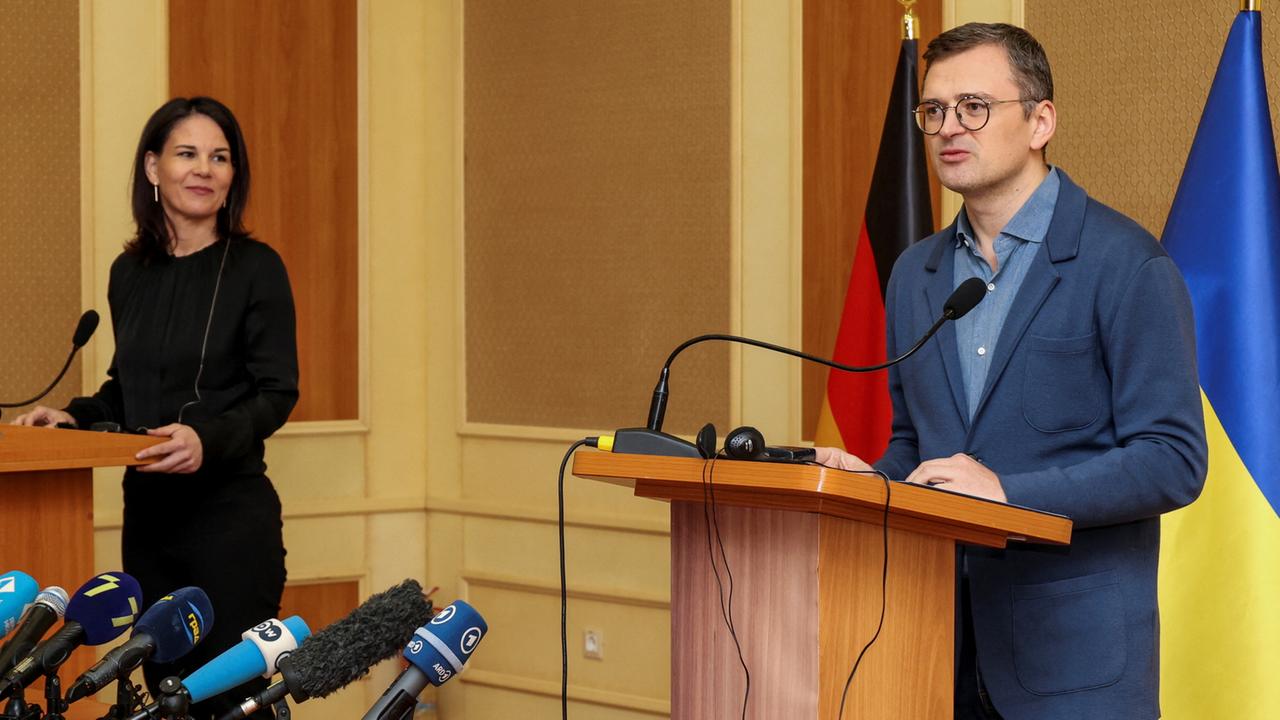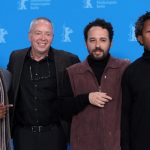Foreign Minister Baerbock traveled to Odessa to mark the anniversary of the Russian attack on Ukraine. There she promised further support – and a small change in German usage.
Two years have passed since the Russian invasion of Ukraine. On the occasion of this anniversary, Foreign Minister Annalena Baerbock visited the country and assured the government of further help: weapons, but also support on the way to the European Union.
As long as Russian President Vladimir Putin is not prepared to stop the war, “we will support you every day” with arms deliveries “that will not only recapture, but save people's lives every day,” said the Green politician at a joint appearance with Ukrainian Foreign Minister Dmytro Kuleba in the southern Ukrainian port city of Odessa. The past two years have shown: “No rocket, no 731 days of bomb terror can break Ukraine's desire for freedom.”
Baerbock also had a linguistic gift with him: the federal government is changing the spelling of the Ukrainian capital in its official language. In the future we will no longer be talking about Kiev – but about Kyiv. “We have completed what was long overdue: the spelling of your capital in the Ukrainian language,” said Baerbock at a press conference with Kuleba.
Thanks, but also accusations
Ukraine had long asked for a change in the German spelling to be closer to the Ukrainian name of the capital. According to the Ukrainian interpretation, the spelling “Kiev” is too similar to the Russian language. The Ukrainian Foreign Minister thanked for the new language. “We have fought for many years to ensure that Ukraine is not viewed through the Russian language,” Kuleba said. “I would like to thank everyone who fights for historical justice – even in small details.”
However, when it came to supporting Ukraine in the war, Kuleba also blamed Germany and the West, especially for their hesitant behavior. If Germany and the West had “admitted us to the EU and NATO, then this war would never have happened.” Likewise, opportunities to contain Russia were missed at the beginning of the war. “If all decisions regarding arms deliveries had been made and implemented quickly at the beginning of the war, then we would be in Luhansk today and would be talking at the press conference about a Europe from Lisbon to Luhansk.”
Kuleba is again pushing for NATO membership
In his opinion, peace could only be achieved through increased arms deliveries, said Kuleba. “Only by defeating Russia on the battlefield can we force it to a lasting and just peace.” He once again pushed for his country to join NATO as soon as possible. Ukraine is not a burden, but rather a strengthening of the military alliance. Kiev is able to protect the Euro-Atlantic area from Russia. “No one in NATO today is coping with the task better than the armed forces of Ukraine,” he emphasized. Kuleba highlighted three positions needed in weapons deliveries: “grenades, anti-aircraft defenses and long-range missiles.”
President Volodymyr Zelensky had previously appeared confident of victory on the occasion of the anniversary. “We will win,” he said at a memorial event at the military airfield in Hostomel near Kiev. “We have been fighting for this for 730 days of our lives,” Zelensky said. “We will win on the best day of our lives.”
The official ceremony was also attended by several Western leaders who traveled to Ukraine to mark the anniversary. Zelensky received EU Commission President Ursula von der Leyen, Canadian Prime Minister Justin Trudeau, Italian Prime Minister Giorgia Meloni and Belgian Prime Minister Alexander de Croo at the Hostomel military air base.
“The brave people of Ukraine amaze the world”
EU Commission President Ursula von der Leyen said: “Exactly two years ago it seemed as if everything was lost and would fall within a few days.” But thanks to the courage of the Ukrainians, that didn't happen. “The brave people of Ukraine continue to amaze the world,” emphasized von der Leyen. She assured that the EU would continue to support Ukraine.
Russian invasion began on February 24, 2022
The Russian army invaded Ukraine on February 24, 2022 on the orders of Kremlin boss Vladimir Putin. Hostomel was captured by Russian units in the first days of the war, but were later driven out by the Ukrainian army. After more than a year of deadlocked fighting, Moscow is now going on the offensive again, especially in eastern Ukraine.
Meanwhile, Ukrainian soldiers are increasingly suffering from a lack of ammunition. Zelenskyj repeatedly calls for accelerated deliveries of ammunition and weapons. The sanctions imposed by the West against Moscow because of the war have not yet had the desired effect.
Stoltenberg: “We must not lose courage”
NATO Secretary General Jens Stoltenberg once again assured Ukraine of a future as a member of the defense alliance. Two years ago “the biggest war in Europe since the Second World War began.” The situation on the battlefield is “still extremely serious.” But Ukraine has repeatedly demonstrated remarkable skill and fighting determination. With his war, Putin achieved the opposite of what he wanted, explained Stoltenberg. “Ukraine is now closer to NATO than ever before.” Ukraine will join the alliance, he emphasized. The question is not if, but when this will happen.




